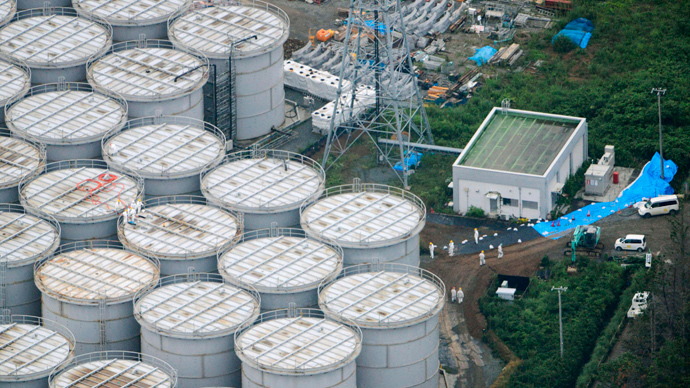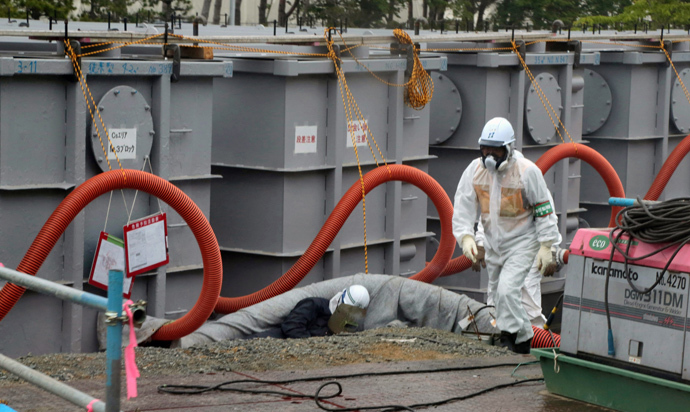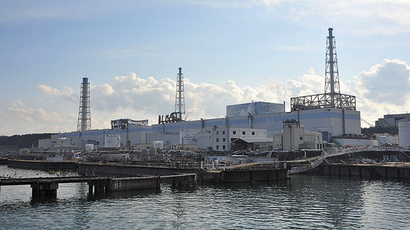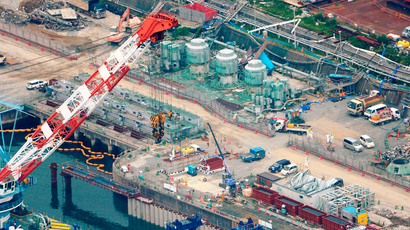Fukushima operator pleads for international help as radiation crisis deepens

TEPCO, operator of the crippled Fukushima nuclear plant, admits it needs overseas help to contain the radioactive fallout, after 18 months of trying to control it internally. It comes after the latest leak at the facility was deemed a “serious incident.”
"Many other countries outside of Japan have experienced
decommissioning reactors, so we hope we can consult them more and
utilize their experience,” TEPCO’s vice president, Zengo
Aizawa, said at a news conference on Wednesday night.
"In that sense, we need support, not only from the Japanese
government but from the international community to do this
job."
The call comes after one of the 1,060 temporary tanks used to
store highly contaminated water sprang a leak on Wednesday,
discharging as much as 300 tons of radioactive liquid containing
large amounts of cesium. Further tests revealed excessive
radiation levels elsewhere in the facility.
Japan’s Nuclear Regulation Authority (NRA) rated the incident 3
on the International Nuclear and Radiological Event Scale, which
spans from 1 to 7.
"The current situation is at the point where more surveillance
won't be enough to keep the accidents from happening,"
declared Shunichi Tanaka, chairman of the NRA.
The UN’s International Atomic Energy Agency (IAEA) has said that
it is “taking this matter seriously and remains ready to
provide assistance on request."
In the past, Japan has been averse to letting foreign entities
help with eradicating the nuclear fallout from the Tohoku
Disaster of March 2011. The vast majority of clear-up tenders
were won by local companies, and outside experts have observed
from afar.
The leak is the latest - and most serious - in a string of
accidents that have kept the station in the headlines throughout
the summer.

TEPCO admitted that groundwater that floods the damaged basements
of the destroyed reactors is becoming contaminated and flowing
out into the ocean. Three-hundred tons of the radioactive
liquid reached the open water each day, even as TEPCO continued
to deny the existence of the problem.
The financially-troubled company is attempting to construct a
chemical and steel double barrier to stop this outflow, but the
obstacle is not impermeable and only covers a limited area
- requiring water to be pumped away to stop it from building up
and bursting through.
Its tanks, which are used to keep the coolant that prevents the
damaged reactors from overheating dangerously, are considered to
be unsuitable because they were made for other industrial
purposes. They were adapted following the emergency, but they are
nearly full. TEPCO estimates that it has already reached 85
percent capacity, although plans to create a more permanent
facility have so far not materialized. The latest leak was the
fifth time that toxic water escaped from a basin.
TEPCO has been slow in measuring the levels of radioactive
elements that have flowed out of the station, as well as
publishing its data. The company finally revealed this
month that highly unsafe tritium and cesium levels had been
detected in the seawater near the plant. A concentration of these
elements could damage the marine environment and build up in
marine life, possibly endangering humans further up the food
chain.
"The contaminated water remains a problem that could lead to a
crisis," Aizawa conceded during the press call.
“Unfortunately, TEPCO waited until a severe emergency arose to
finally report how bad things really are. Historically,
everything TEPCO says always turns out to be much worse than they
initially admit,” nuclear accident researcher Christina
Consolo told RT.
Most experts say that it could take between four decades and a
century to eliminate the impact of the Fukushima disaster.














